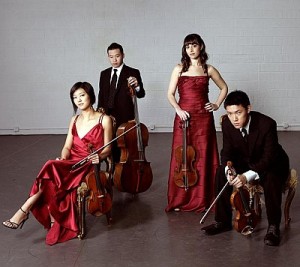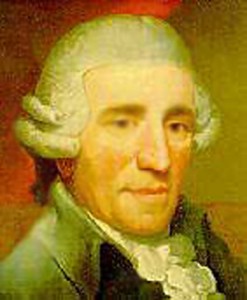Classical Music Review: The Parker Quartet’s Haydn
The Parker Quartet’s appearance here in Jordan Hall on November 22 was marked by one surprising feature: there was not a single music stand to be seen on the stage. It turned out that the four musicians played the entire concert from memory.
By Caldwell Titcomb
Haydn is widely called the Father of the Symphony, having penned 106 examples in his long career. But the credit for establishing the genre as a four-movement work with a slow introduction and minuet really belongs to a lesser composer, Leopold Hofmann (1738–93). But Haydn actually can be considered the Father of the String Quartet, with some 70 works written between ca. 1758 and 1803.
One is lucky to hear just one Haydn quartet in a concert. What the Parker Quartet did was to devote an entire evening to Haydn, jointly sponsored by the Celebrity Series and the New England Conservatory (NEC). The NEC was involved since the four players—Daniel Chong and Karen Kim, violins; Jessica Bodner, viola; Kee Hyun Kim, cello—all hold graduate degrees from that institution.
The foursome began touring professionally in 2002 and has won a number of important prizes and competitions. Currently the group is in its second year as quartet-in-residence with the Saint Paul Chamber Orchestra, giving performances and participating in educational programs with local schools.
The Parker Quartet’s appearance here in Jordan Hall on November 22 was marked by one surprising feature: there was not a single music stand to be seen on the stage. It turned out that the four musicians played the entire concert from memory. I have seen a quartet play standing up (except for the cellist), and I’ve seen the first and second violinists exchange seats. But I don’t recall ever seeing players with no stands in front of them.
The program offered three wonderful quartets, performed in chronological order. The first was Op. 20, No. 2 in C-major (1771). The slow movement, in C-minor, contained unexpected silences—a standard feature of Haydn’s style. The triple-meter third movement exhibited a lot of syncopated rhythm. The finale was labeled “fugue on four subjects,” looking back to a favored genre of the baroque period. Two other quartets from the Op. 20 set end with fugues, and Haydn would return to the device only once more (the finale of Op. 50, No. 4).
Next came Op. 74, No. 3 in G-minor (1793), nicknamed “The Rider” or “The Horseman” owing to the music’s galloping upward leaps. In the first movement, the Parker Quartet chose not to observe the indicated repeat of the second half. The Largo is in the unusual key of E-major. The Menuetto, in G-major, is really a scherzo, and the Allegro finale calls for virtuosic playing from every instrument—the cello as much as the rest.
After intermission we heard Op. 77, No. 2 in F-major (1799), the most familiar item on the program. Once again the cellist had to be as fleet-fingered as the other players. The scherzo (though still labeled Menuetto) has a trio in D-flat-major. The Andante is in D-major, and the sonata-form Vivace finale has a Polish flavor. The four players made the execution look easy all evening though the technical demands were high.
As an encore the Parker played the scherzo from Op. 77, No. 1 in G-major (1799). Papa Haydn would have been pleased.


